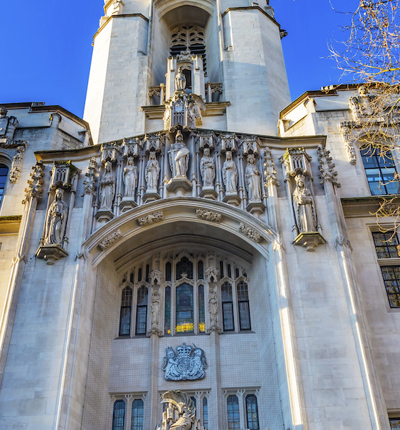
Supreme Court to hear landmark case on transparency of court documents
A Supreme Court hearing will take place next month on behalf of an asbestos campaign group
Posted on 25 January 2019
A Supreme Court hearing taking place next month on behalf of an asbestos campaign group could have wide-ranging implications for the future disclosure of documents used in Court proceedings and will impact on the access to documents given to people and organisations who are not part of court proceedings.
Due to the implication of the Court case to journalists, The Media Lawyers Association has successfully applied to intervene at the hearing.
The two-day Supreme Court hearing, which starts on 18 February 2019, follows a landmark judgment in the Court of Appeal in July 2018, which ruled that Graham Dring, on behalf of the Asbestos Victims Support Group Forum UK, had a legitimate interest and should be given copies of key documents from previous court proceedings against the asbestos manufacturer Cape Intermediate Holdings Limited at which he was not a party.
The documents from a previous hearing, at which Cape was the defendant, will shed light on the knowledge the company had of the dangers of asbestos.
The Court of Appeal judgment upheld part of an earlier decision which is believed to have been the first time a non-party to a legal case has established the entitlement to copies of such a large number of documents used at trial.
Mr Dring was represented by Harminder Bains, Partner at Leigh Day, who initially applied for copies of the documents and took out an injunction in April 2017 to prevent them from being destroyed under a confidential agreement between Cape and its opponents.
Miss Bains requested Cape to hand over the documents to the Forum due to their potential significance to issues in asbestos claims. However, Cape refused on the basis that the Forum had no legitimate interest and was not party to the original Court action.
On 5 December 2017, after a three-day hearing, Master Victoria McCloud handed down a lengthy judgment in which she found that the Forum did have a legitimate interest in obtaining copies of the documents requested and ordered that the Forum be entitled to copies of all the documents in the trial bundle.
Cape appealed the Master’s judgment to the Court of Appeal which upheld access to all documents which had been read by the trial judge or which he was invited to read.
The Forum has stated throughout its legal case that its aim is to provide the documents to interested parties, including academics, lawyers, and members of the public, due to the highly significant and historical value of the documents.
Graham Dring said:
“The Court of Appeal ruled that we should be provided access to a significant number of documents, which Cape Intermediate Holdings (Cape) have refused to disclose: documents which may assist mesothelioma sufferers and their families to claim compensation, and which may throw light on the way early knowledge of the dangers of asbestos was hidden from the public.
“Cape should now cease their self-serving resistance to disclosure and accept this judgment in full.”
Harminder Bains, a partner in the industrial diseases team at Leigh Day, said:
“The Court of Appeal judgment made it clear that the Forum is entitled to copies of the documents which have been read in open Court, documents which the judge has been invited to read in open Court, documents which the judge has been specifically invited to read outside of Court or documents which it is clear or stated that the judge has read, skeleton arguments, and written submissions.
“We hope that The Supreme Court agrees that Cape should now accept the Forum’s entitlement to copies of the documents and put a halt to its determined effort to prevent the Forum and other judges from seeing them.”
Counsel representing the Claimants are Robert Weir QC and Jonathan Butters of Devereux Chambers.

